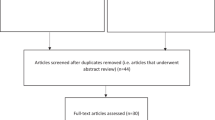Abstract
In this article, we explore how Islam, minority status and refugee experiences intersect in shaping meaning-making processes following bereavement. We do this through a phenomenological analysis of a biographical account of personal loss told by Aisha, a Muslim Palestinian refugee living in Denmark, who narrates her experience of losing her husband to lung cancer. By drawing on a religious framework, Aisha creates meaning from her loss, which enables her to incorporate this loss into her life history and sustain agency. Her narrative invites wider audiences to witness her tale of overcoming loss, thus highlighting the complex way in which religious beliefs, minority status and migration history come together in shaping meaning-making processes, and the importance of reciprocity in narrative studies.
Similar content being viewed by others
References
Becker, G. (1999). Disrupted lives: How people create meaning in a chaotic world. Berkeley: University of California Press.
Bhattacharya, H. (2010). New critical collaborative ethnography. In S. N. Hesse-Biber & P. Leavy (Eds.), Handbook of emergent methods (pp. 303–322). New York: The Guilford Press.
Brison, K. J., & Leavitt, S. C. (1995). Coping with bereavement: Long-term perspectives on grief and mourning. Ethos, 23(4), 395–400.
Brubaker, R., & Cooper, F. (2000). Beyond “identity”. Theory and Society, 29, 1–47.
De Souza, R. (2004). Motherhood, migration and methodology: Giving voice to the “other”. The Qualitative Report, 9(3), 463–482.
Dossa, P. (1999). (Re)imagining aging lives: Ethnographic narratives of Muslim women in diaspora. Journal of Cross-Cultural Gerontology, 14, 245–272.
Dossa, P. (2002). Narrative mediation of conventional and new “mental health” paradigms: Reading the stories of immigrant Iranian women. Medical Anthropology Quarterly, 16(3), 341–359.
Dossa, P. (2006). “Witnessing” social suffering. migratory tales of women from Afghanistan. In Research on immigration and integration in the metropolis working paper series. Vancouver, BC: Vancouver Centre of Excellence.
Firth, S. (1997). Dying, death and bereavement in a British Hindu community. Leuven: Peeters Publishers.
Frank, A. W. (1995). The wounded storyteller: Body, illness, and ethics. Chicago: University of Chicago Press.
Frank, A. W. (2004). Narratives of spirituality and religion in end-of-life care. In B. Hurwitz, T. Greenhalgh, & V. Skultans (Eds.), Narrative research in health and illness (pp. 132–145). Massachusetts: Blackwell Publishing Ltd.
Hurwitz, B., Greenhalgh, T., & Skultans, V. (2004). Introduction. In B. Hurwitz, T. Greenhalgh, & V. Skultans (Eds.), Narrative research in health and illness (pp. 1–20). Massachusetts: Blackwell Publishing Ltd.
Jackson, M. (1998). Minima ethnographica: Intersubjectivity and the anthropological project. Chicago: University of Chicago Press.
Jackson, M. (2002). The politics of storytelling: Violence, transgression and intersubjectivity. Copenhagen: Museum Tusculanum Press.
Klass, D., & Goss, R. (2003). The politics of grief and continuing bonds with the dead: The cases of Maoist China and Wahhabi Islam. Death Studies, 27, 787–811.
Kleinman, A. (1988). The illness narratives: Suffering, healing, and the human condition. New York: Basic Books.
Kleinman, A. (1994). Pain and resistance: The delegitimation and delegitimation of local worlds. In M.-J. D. Good, P. E. Brodwin, B. J. Good, & A. Kleinman (Eds.), Pain as human experience: An anthropological perspective (pp. 169–197). Berkeley: University of California Press.
Kleinman, A., Brodwin, P. E., Good, B. J., & Good, M.-J. D. (1994). Pain as human experience: An introduction. In M.-J. D. Good, P. E. Brodwin, B. J. Good, & A. Kleinman (Eds.), Pain as human experience: An anthropological perspective (pp. 1–28). Berkeley: University of California Press.
Kristiansen, M., & Sheikh, A. (2012). Understanding faith considerations when caring for bereaved Muslims. Journal of Royal Society of Medicine, 105, 513–517.
Lutz, C. (1992). Motivated models. In R. D’Andrade & C. Strauss (Eds.), Human motives and cultural models (pp. 181–196). New York: Cambridge University Press.
Okely, J. (1992). Anthropology and autobiography. Participatory experience and embodied knowledge. In J. Okely & H. Callaway (Eds.), Anthropology and autobiography (pp. 1–28). London: Routledge.
Padela, A. I., Killawi, A., Forman, J., DeMonner, S., & Heisler, M. (2012). American Muslim perceptions of healing: Key agents in healing, and their roles. Qualitative Health Research, 22(6), 846–858.
Rubin, S. S., & Yasien-Esmael, H. (2004). Loss and bereavement among Israel’s Muslims: Acceptance of God’s will, grief, and the relationship to the deceased. OMEGA, 49(2), 149–162.
Scheper-Hughes, N. (1993). Death without weeping: The violence of everyday life in Brazil (2nd ed.). Berkeley: University of California Press.
Suhail, K., Jamil, N., Oyebode, J., & Ajmal, M. A. (2011). Continuing bonds in bereaved Pakistani Muslims: Effects of culture and religion. Death Studies, 35, 22–41.
Taylor, C. (2006). Narrating significant experience: Reflective accounts and the production of (self) knowledge. British Journal of Social Work, 36(2), 189–206.
Walter, T. (1996). A new model of grief: Bereavement and biography. Mortality: Promoting the Interdisciplinary Study of Death and Dying, 1(1), 7–25.
Wikan, U. (1988). Bereavement and loss in two Muslim communities: Egypt and Bali compared. Social Science and Medicine, 27(5), 451–460.
Wortmann, J. H., & Park, C. L. (2008). Religion and spirituality in adjustment following bereavement: An integrative review. Death Studies, 32(8), 703–736.
Author information
Authors and Affiliations
Corresponding author
Rights and permissions
About this article
Cite this article
Kristiansen, M., Younis, T., Hassani, A. et al. Experiencing Loss: A Muslim Widow’s Bereavement Narrative. J Relig Health 55, 226–240 (2016). https://doi.org/10.1007/s10943-015-0058-x
Published:
Issue Date:
DOI: https://doi.org/10.1007/s10943-015-0058-x




